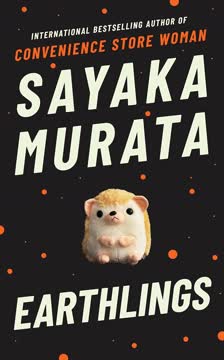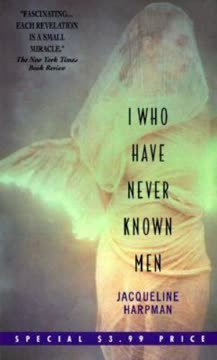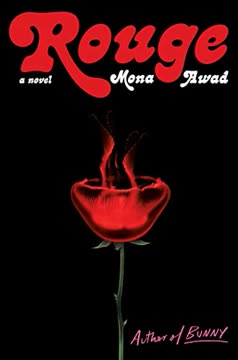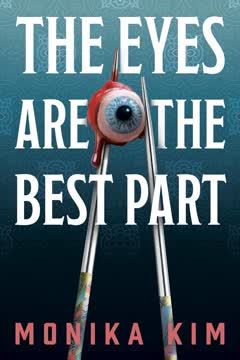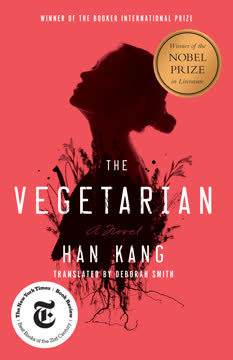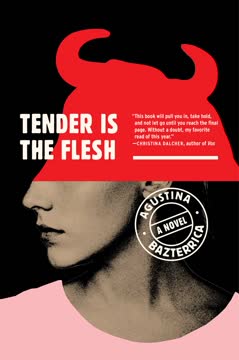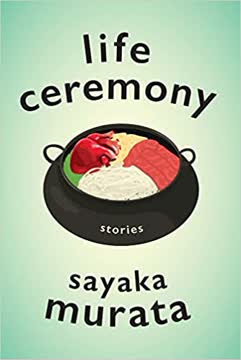Plot Summary
Arrival in the Mountains
Natsuki, an imaginative eleven-year-old, travels with her family to her grandparents' rural home for the Obon festival. The journey is marked by her sense of alienation from her family, her fascination with the darkness of the mountains, and her secret belief in her own magical powers, bestowed by her plush toy Piyyut from Planet Popinpobopia. The family dynamic is tense: her mother dotes on her older sister Kise, while her father is silent and distant. Natsuki's anticipation centers on reuniting with her cousin Yuu, her closest confidant and, in her mind, her boyfriend. The mountain setting, with its lingering night and ancestral rituals, becomes a space where Natsuki's inner world and reality blur, setting the stage for a story of survival, otherness, and the search for belonging.
Magicians and Aliens
Natsuki and Yuu, both outsiders in their own families, forge a deep connection through shared fantasy. Natsuki reveals her identity as a magician, while Yuu confides that he is an alien, possibly from the same planet as Piyyut. Their secret promises and imaginative play become a refuge from the confusing and sometimes hostile adult world. The cousins' relationship is cemented by a pinky-swear pact: to keep each other's secrets and remain loyal, even as the world around them demands conformity. The rural house, with its silkworm room and ancestral rituals, is a liminal space where their identities as "not-quite-human" can flourish, if only for the summer. Their bond is both innocent and charged with the longing to escape the constraints of family and society.
The Baby Factory
Back in her suburban town, Natsuki sees her world as a "Baby Factory," where families are breeding pairs in nests, and children are future components. She feels alienated from this system, especially as she approaches puberty and is taught about her body's reproductive role. Her marriage to Yuu, solemnized in secret, is a desperate attempt to claim agency over her own life before society forces her into a prescribed role. The metaphor of the factory pervades her thinking: adults are tools, children are products, and love is a mechanism for breeding. Natsuki's magical thinking is both a shield and a symptom of her inability to fit into the world's expectations.
Broken Mouth, Broken World
Natsuki's world is further fractured by abuse at the hands of her cram school teacher, Mr. Igasaki. His predatory behavior is insidious, masked by the authority and trust of adulthood. When Natsuki tries to confide in her mother, she is met with disbelief and blame, deepening her sense of isolation and worthlessness. The trauma manifests physically—her mouth "breaks," and she loses the ability to taste, symbolizing her loss of agency and voice. The only way to survive is to become invisible, to obey, and to retreat into magical thinking. The chapter is a harrowing depiction of how abuse and adult complicity can destroy a child's sense of self.
The Teacher's Secret
Natsuki's abuse continues, and her attempts to seek help are met with denial or ridicule. She dissociates, experiencing out-of-body episodes as a form of magical escape. The adults around her—teachers, parents, friends—are either blind to her suffering or complicit in maintaining the status quo. The only solace is her secret world with Yuu and Piyyut, and the promise to "survive, whatever it takes." The chapter explores the devastating effects of adult indifference and the lengths to which children will go to protect themselves, even if it means retreating into fantasy or silence.
Survive, Whatever It Takes
Natsuki and Yuu's secret wedding, held at the family grave, is a poignant act of resistance against a world that seeks to control their bodies and destinies. Their marriage pledge—never to betray each other, to wear their rings at night, and to survive at all costs—becomes a talisman for enduring the traumas to come. The vow to "survive, whatever it takes" is seared into Natsuki's psyche, shaping her actions and worldview. The chapter is suffused with longing, fear, and the desperate hope that love and imagination can offer protection in a hostile world.
The Secret Wedding
The secret wedding is both a literal and symbolic act. Natsuki and Yuu, children on the cusp of adolescence, use ritual to assert control over their lives. The ceremony, witnessed only by Piyyut and the spirits of their ancestors, is a moment of agency and connection. Yet, it is also tinged with the knowledge that their union is fragile, threatened by the inexorable pull of family, society, and biology. The wedding ring, the marriage pledge, and the act of hiding their love are all acts of defiance against a world that refuses to see or protect them.
The End of Childhood
The summer ends abruptly when Natsuki's sister's distress forces the family to leave Akishina early. The cousins are separated, and the promise of reunion is uncertain. Back home, Natsuki is plunged into a world of surveillance, punishment, and silence. Her magical powers wane, and the reality of her abuse becomes inescapable. The chapter marks the end of childhood innocence and the beginning of a long struggle to survive in a world that is indifferent or hostile to her pain.
The Factory's Grip
As Natsuki grows up, the pressures of the Baby Factory intensify. She is expected to study, work, marry, and reproduce. Her trauma isolates her from her peers, and her inability to conform is pathologized. Attempts to confide in friends are met with disbelief or minimization. The adult world is revealed as a system that rewards conformity and punishes difference, especially in women. Natsuki's sense of being an alien becomes both a curse and a source of resilience, as she clings to the hope that she is not alone in her otherness.
Adult Escape Plans
In adulthood, Natsuki enters a marriage of convenience with Tomoya, a man equally alienated from society's expectations. Their relationship is based on mutual non-interference: no sex, no children, separate lives under one roof. This arrangement allows them to evade the scrutiny of the Factory, but it is also a form of exile. Both are haunted by their pasts and the knowledge that they are not "normal." The chapter explores the compromises and bargains made to survive in a world that demands conformity, and the ways in which trauma shapes adult relationships.
Return to Akishina
Natsuki and Tomoya return to Akishina, seeking refuge from the pressures of the Factory. The reunion with Yuu is awkward but charged with the possibility of healing. The house, once a site of childhood magic and trauma, becomes a space for the three to reconnect and confront their pasts. The rural setting, with its silence and isolation, offers a chance to imagine a different way of living—one not dictated by the rules of society. The chapter is suffused with nostalgia, longing, and the tentative hope of building a new family of choice.
Reunion and Alien Eyes
The three adults—Natsuki, Tomoya, and Yuu—share their stories and secrets, revealing the depth of their alienation from society. They discuss the concept of the "alien eye," a way of seeing the world that resists the brainwashing of the Factory. Their conversations are awkward, sometimes painful, but also liberating. The possibility of forming a new kind of family, based on mutual understanding and acceptance of difference, emerges. Yet, the threat of the Factory's surveillance and the pull of conformity remain ever-present.
Training to Be Alien
The trio embarks on a deliberate process of "training" to become Popinpobopians—aliens in human form. They reject the routines and values of Earthlings, living according to their own logic and needs. This includes foraging, stealing food, and abandoning social conventions like clothing and cleanliness. Their experiment is both liberating and precarious, as they struggle to balance survival with the desire for authenticity. The chapter explores the possibilities and limits of self-invention, and the costs of rejecting society's rules.
The Factory Strikes Back
The outside world intrudes: family members, neighbors, and the authorities begin to close in. Natsuki's sister, now a true believer in the Factory, becomes an agent of surveillance and control. The trio's fragile sanctuary is threatened by gossip, suspicion, and the ever-present demand to conform. The chapter dramatizes the impossibility of complete escape from society, and the ways in which the Factory enforces its rules through both overt and subtle means.
The Last Supper
Cut off by a landslide and running out of food, the trio faces the prospect of starvation. The metaphor of the Last Supper becomes literal as they contemplate cannibalism. The boundaries between self and other, human and alien, are blurred as survival takes precedence over morality. The chapter is a meditation on the extremities of isolation, the fragility of civilization, and the lengths to which people will go to survive.
Becoming Popinpobopian
In a shocking and surreal turn, the trio kills and eats two intruders—Earthlings seeking revenge for past wrongs. The act of cannibalism is both horrifying and ecstatic, marking a final break with human society and a rebirth as true Popinpobopians. The experience restores Natsuki's senses and sense of agency, as she claims her body and identity anew. The chapter is a grotesque but cathartic exploration of transformation, survival, and the creation of a new self.
Cannibal Feast
The trio, now fully alien in their own eyes, feast on each other, blurring the boundaries between self and other, love and hunger, life and death. Their communion is both literal and symbolic—a final rejection of the Factory and an embrace of a new, post-human existence. The act is depicted as both rational and ecstatic, a culmination of their journey from trauma and alienation to self-acceptance and mutual recognition.
Multiplying in the Snow
Rescue arrives, but the trio, now transformed, are unrecognizable to the Earthlings who find them. Pregnant with new life—literal or metaphorical—they declare their alien identity and the inevitability of their multiplication. The story ends with the promise of a new beginning, as the boundaries between human and alien, self and other, are dissolved in the snowy landscape. The final image is one of emergence, possibility, and the unsettling power of difference.
Characters
Natsuki
Natsuki is the protagonist, a woman marked by childhood trauma, abuse, and a profound sense of otherness. Her belief in magic and aliens is both a coping mechanism and a declaration of resistance against a world that seeks to erase her individuality. Natsuki's relationships—with her cousin Yuu, her plush toy Piyyut, and later her husband Tomoya—are shaped by her longing for connection and her fear of betrayal. Psychologically, she is both fragile and resilient, oscillating between dissociation and fierce determination. Her journey is one of survival at all costs, culminating in a radical rejection of societal norms and a redefinition of family, identity, and humanity itself.
Yuu
Yuu is Natsuki's cousin and childhood soulmate, equally alienated from his family and society. His self-identification as an alien reflects his inability to fit in and his sensitivity to the unspoken demands of others. Yuu's coping strategy is compliance—he survives by intuiting and fulfilling the expectations of those around him. As an adult, he is gentle, passive, and haunted by the loss of agency. His reunion with Natsuki and Tomoya offers a chance at self-determination, but his journey is fraught with ambivalence and the lingering pull of conformity. Yuu's development is a study in the costs and possibilities of survival through submission and, ultimately, transformation.
Tomoya
Tomoya is Natsuki's husband, a man who shares her alienation from the Baby Factory but approaches it with a rational, almost clinical detachment. His refusal to engage in sex or reproduction is both a personal preference and a political act. Tomoya is articulate, self-aware, and committed to living according to his own logic, even as he struggles with depression and the threat of societal exclusion. His partnership with Natsuki is based on mutual respect for difference and a shared desire to escape the Factory's gaze. Tomoya's journey is one of self-invention, resistance, and, ultimately, communion with others who share his sense of otherness.
Kise
Kise is Natsuki's older sister, the family favorite and a true believer in the values of the Baby Factory. Her struggles with bullying and self-image are resolved through conformity and the embrace of motherhood. As an adult, Kise becomes an agent of the Factory, surveilling and policing Natsuki's behavior. Psychologically, she is both vulnerable and ruthless, seeking validation through the approval of others and the enforcement of social norms. Her relationship with Natsuki is fraught with jealousy, resentment, and a deep-seated need to maintain the boundaries of normality.
Mom
Natsuki's mother is a source of both pain and longing. She is emotionally distant, critical, and quick to blame Natsuki for any disruption to the family's image. Her primary allegiance is to the smooth functioning of the Baby Factory, and she is unable or unwilling to see her daughter's suffering. Psychologically, she is a product of her own traumas and the pressures of conformity, but her inability to protect or believe Natsuki is a central wound in the protagonist's life.
Mr. Igasaki
Mr. Igasaki is Natsuki's cram school teacher and abuser, a figure who embodies the dangers of adult authority and the complicity of society in protecting predators. His actions shatter Natsuki's sense of safety and agency, and his murder—whether real or imagined—becomes a turning point in her journey. Psychologically, he represents the dark side of the Factory: the exploitation and silencing of the vulnerable in the name of order and normality.
Piyyut
Piyyut is Natsuki's plush toy and the source of her magical powers. He is both a comfort object and a symbol of her resilience and creativity. Through Piyyut, Natsuki constructs a narrative of survival and resistance, transforming trauma into a story of cosmic significance. Psychologically, Piyyut is a projection of Natsuki's need for protection, agency, and meaning in a world that denies her all three.
Uncle Teruyoshi
Uncle Teruyoshi is a rare adult ally, offering Natsuki and Yuu moments of kindness and understanding. His home in Akishina is a site of both trauma and healing, a space where the boundaries between human and nonhuman, self and other, are blurred. Psychologically, he represents the possibility of acceptance and the importance of chosen family.
Shizuka
Shizuka is Natsuki's childhood friend, whose trajectory from outsider to model citizen mirrors the pressures of the Factory. As an adult, she becomes a conduit for societal expectations, urging Natsuki to conform and reproduce. Psychologically, she is both a reminder of what Natsuki has lost and a warning of what she might become.
Dad
Natsuki's father is a largely absent figure, emotionally withdrawn and unable to protect his daughter. His silence is both a shield and a weapon, allowing the abuses and betrayals of the family to go unchallenged. Psychologically, he represents the dangers of passivity and the costs of survival through avoidance.
Plot Devices
Magical Realism and Dissociation
The novel employs magical realism as both a narrative device and a psychological strategy. Natsuki's belief in magic, aliens, and her own special powers is a way to make sense of and survive the traumas of abuse, neglect, and societal alienation. The boundaries between fantasy and reality are deliberately porous, reflecting the protagonist's dissociative coping mechanisms. This device allows the reader to experience the world through Natsuki's eyes, where the impossible becomes possible, and survival is an act of imagination as much as will.
The Factory Metaphor
The recurring metaphor of the Baby Factory is central to the novel's critique of societal norms. Families are breeding pairs, children are products, and adults are tools. This device exposes the dehumanizing effects of conformity, the erasure of individuality, and the violence done in the name of order. The metaphor is extended through imagery of nests, silkworms, and machinery, creating a sense of claustrophobia and inevitability.
Ritual and Pacts
Rituals—weddings, promises, and secret ceremonies—are used to create meaning and agency in a world that denies both. The marriage pledge between Natsuki and Yuu, the secret wedding, and the later divorce ceremony with Tomoya are all acts of self-definition and resistance. These rituals are both poignant and tragic, highlighting the fragility of agency in the face of overwhelming social pressure.
Cannibalism and Transformation
The turn to cannibalism in the novel's climax is both literal and symbolic. It represents the ultimate rejection of societal norms and the embrace of a new, post-human identity. The act is depicted as both rational and ecstatic, a moment of transcendence and horror. This device forces the reader to confront the limits of empathy, the costs of survival, and the possibility of transformation through radical otherness.
Foreshadowing and Circular Structure
The novel is structured around cycles: the return to Akishina, the repetition of trauma, the recurrence of vows and rituals. Foreshadowing is used to create a sense of inevitability, as childhood wounds resurface in adulthood and the past is never truly left behind. The story's end echoes its beginning, suggesting that survival is both a return and a departure, a breaking of cycles and the creation of new ones.
Analysis
Sayaka Murata's Earthlings is a searing exploration of trauma, alienation, and the violence of societal conformity. Through the eyes of Natsuki, the novel interrogates the costs of survival in a world that demands obedience, erases difference, and punishes those who refuse to play their assigned roles. The metaphor of the Baby Factory exposes the dehumanizing logic of reproduction, family, and work, while the use of magical realism and dissociation offers both a critique and a means of escape. The story's descent into cannibalism and post-human transformation is both shocking and cathartic, forcing readers to confront the limits of empathy and the possibilities of radical otherness. Ultimately, Earthlings is a meditation on the meaning of survival: to endure is not merely to persist, but to claim agency, to imagine new forms of kinship, and to embrace the monstrous, the alien, and the unknown within and without. The novel's lesson is both bleak and hopeful: in a world that refuses to see or protect the vulnerable, survival may require the creation of new worlds, new languages, and new selves.
Last updated:
Review Summary
Earthlings is a controversial and disturbing novel that explores themes of alienation, conformity, and trauma. Reviews are polarized, with some praising its uniqueness and dark humor, while others find it deeply unsettling. The book follows Natsuki, a woman who believes she's an alien, as she navigates a society she doesn't fit into. Many readers warn of graphic content, including child abuse, incest, and cannibalism. While some appreciate Murata's commentary on societal norms, others feel the shock value overshadows the message. The novel's bizarre plot and provocative themes make it a divisive read.
Similar Books
Download PDF
Download EPUB
.epub digital book format is ideal for reading ebooks on phones, tablets, and e-readers.
